 How much time are you spending on social media? Can you tell if it's helping sales?
How much time are you spending on social media? Can you tell if it's helping sales?
Wouldn't it be nice to have a framework for measuring the impact of your social media efforts?
That's where Susan Etlinger's new research for the Altimeter Group comes into play. Susan did qualitative research with 60 social media marketers and vendors to understand how businesses currently measure their social media performance.
Her goal: to develop a framework for tying social media performance to business goals.
NOTE: Because Susan's original research targeted enterprise-level companies, I interviewed her to add some small business insights. The following comments combine results of the research and that interview.
Start with your strategic goals
Business owners who see great social media success tie their technology choices to their strategic goals. The following graphic shows the importance of a thoughtful process when designing your social media plan.
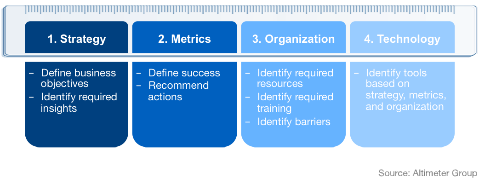
Etlinger advises all businesses follow this process, but particularly small businesses that have limited resources and less tolerance for missteps.
Spend ample time thinking through your vision of success so you can select the right metrics. This means getting specific about your business objectives and strategies before thinking through social objectives. Then you can organize your staff (or your personal time if you're a solopreneur) around those metrics. Only then are you ready to select the best technologies (including which social platforms and measurement tools to use).
Once you've established your goals, then you're ready to consider Altimeter's Social Media Measurement Compass. The points of this compass identify six major business goals that social media can help influence.
Your challenge: determine your goal and then think deeply about how you will measure whether you're achieving that goal.
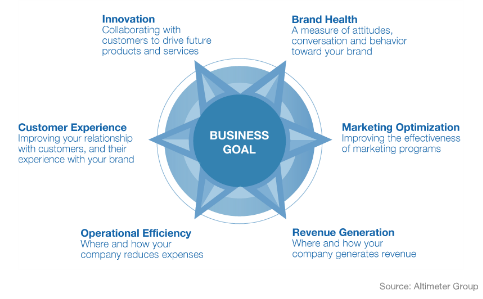
The Six Points of the Compass
#1: Brand Health
Do you know how people are talking about your service, your products or customer experience? Big brands spend lots of money managing their brand image, but small businesses also need to be aware of customers' perceptions.
How are people talking about your service, products and selections?
Etlinger noted that people have no problem complaining directly to big brands, but might feel more reserved about criticizing a small business owner to his or her face.
Social media monitoring can help you hear what people are telling their friends, but might not be willing to tell you directly.
Get World-Class Marketing Training — All Year Long!
Are you facing doubt, uncertainty, or overwhelm? The Social Media Marketing Society can help.
Each month, you’ll receive training from trusted marketing experts, covering everything from AI to organic social marketing. When you join, you’ll also get immediate access to:
- A library of 100+ marketing trainings
- A community of like-minded marketers
- Monthly online community meetups
- Relevant news and trends updates
Beware that you can never hear the whole social media conversation about your brand. There are at least two reasons: 1) Twitter is capturing such large volumes that you can only hear about 5% of the conversation; 2) Privacy settings on Facebook prohibit non-friends from hearing many conversations.
These two factors make it critical to find ways to validate what people are saying. Small business owners may find it challenging to hear critiques, but put on your tough skin and ask some customers (in person and online).
To unveil how social media listening can help you understand your brand health, Etlinger's research discovered the following themes (in the graphic below) as critical for your social media listening.
Notice the insights to be gained and how to measure your listening results to find these indicators of health. (I will not reproduce each matrix for the following measures, but you can see them in her article here.)
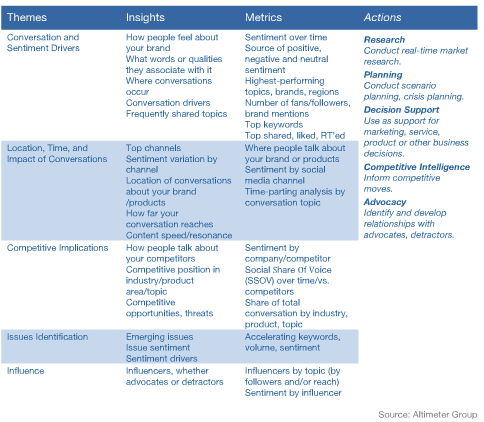
#2: Marketing Optimization
Social media listening can help you fine-tune your marketing efforts to better find your target audience. For many businesses, Google Analytics might be the best tool.
Your goal is to determine what terms people are searching and from what sites they are coming to your site. Some of the things to optimize are campaigns, content, channels, timing and influencers.
It's important to realize that people share differently on different social channels. While not strictly a social media platform, Yelp provides a good example. People wanting to position themselves as food critics are likely to be far more critical on Yelp than they might be on Twitter or Facebook.
#3: Revenue Generation
This measure may be less relevant if you don't have an online store; however, all businesses want to know if social media is driving sales.
Generally, social media shouldn't be expected to directly lead to increased sales. Instead, it can generate leads and conversions. If you think about revenue as a relationship and not just a transaction, as suggested by Richard Binhammer of Dell, then you'll see that social media can have a tremendous influence on the long-term relationship.
Some important things to understand are the impact of social media on: 1) purchase behavior, 2) search results and 3) customer loyalty.
If you have a physical store, make sure you have tracking systems in place for each channel.
You might try campaigns on Facebook, Twitter and Groupon and see what drives repeat business the best. Groupon is likely to attract deal-seekers who might become new customers, whereas your fans on Facebook and Twitter might find themselves more deeply connected after experiencing one of your “Facebook only” deals.

Discover Proven Marketing Strategies and Tips
Want to go even deeper with your marketing? Check out the Social Media Marketing Podcast! Publishing weekly since 2012, the Social Media Marketing Podcast helps you navigate the constantly changing marketing jungle, with expert interviews from marketing pros.
But don’t let the name fool you. This show is about a lot more than just social media marketing. With over 600 episodes and millions of downloads each year, this show has been a trusted source for marketers for well over a decade.
Test the hypothesis and run your own numbers. Results will vary widely based on your business type and fan base.
#4: Operational Savings
Social media can provide opportunities for hard and soft savings to your business. As customers become brand advocates, your brand reach will extend without significant expenses.
Additionally, social platforms can become far less expensive places for handling customer service. That depends on whether you have someone who can be dedicated to listening to online conversations in real time.
One smart practice is to forge relationships with fans who have strong social media influence. These people can become your advocates and even help with customer service. If they've already shown a willingness to speak on your behalf, find ways to feed them information.
#5: Customer Experience
Etlinger's research discovered a direct correlation between social media and customer experience that translated into improved brand health, increased revenue and cost savings.
An example not cited in the report comes from Kraft Foods. The social media listening team discovered a trend on words like “cut,” “blood” and “salad dressing.” Those aren't words you want associated with food, so the team dug deeper to discover that customers were cutting themselves when opening a newly designed salad dressing bottle.
The problem was easily solved, but wouldn't have been discovered without social media. The injuries weren't serious enough to require emergency room treatment. It was merely an inconvenience, so customers didn't call the 1-800 number. Instead they told their friends on social media and forgot about it. Because you don't usually buy salad dressing very often, this problem could've gone undetected for months.
#6: Innovation
As highlighted by Etlinger, Starbucks and Proctor & Gamble have found ways to crowdsource ideas through their innovative sites MyStarbucksIdeas.com and pgconnect.com. Not everyone can resource their own social media innovation site, but all businesses can find ways to listen to their customers for insights into product and service improvements.
For example, Twitter can give you insights into what people want. Follow statements such as, “I like,” “I wish” or “I hate.” If you heard, “I wish Charlie's hadn't discontinued the chicken cordon bleu,” you would have some great intelligence.
Alternatively, you could even start a conversation on Facebook asking your customers for ideas on new products, services or promotions. Maybe you could even host an “Idea Wednesday” where you spend an hour on your Facebook page looking for creative ideas.
Finding the Right Tools
There are many measurement tools available, and quite a few are free or very inexpensive. In addition to Google Analytics, here are some worth checking out:
Simply Measured has created two tools that work well together.
- Export.ly helps you analyze your Facebook fan page, Twitter audience and more through downloading customizable Excel spreadsheets.

- RowFeeder is an inexpensive way to monitor what people are saying about your brand.
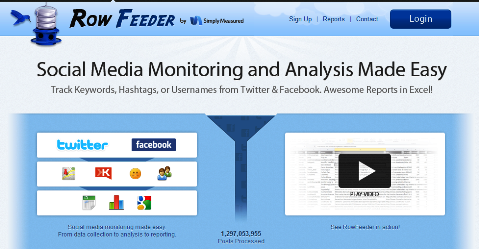
If you want to figure out how often your tweets are being shared and by whom, check out TweetReach.

Edelman has developed two tools called TweetLevel and BlogLevel that measure the level of influence, popularity, engagement and trust on your Twitter account and blog. These can be good indicators of the health of your social media efforts. Edelman also provides helpful tips on how to improve in each of these areas.

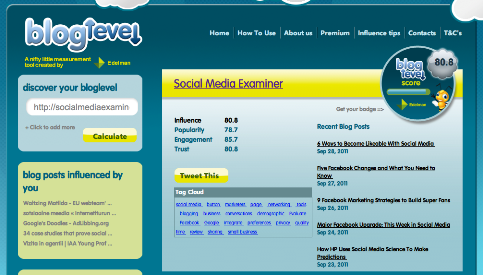
To Learn More
Susan Etlinger has shared more detailed information about the report in the following webinar created for CoreMetrics.
Key takeaways:
- Tie your measurement program to key business objectives.
- Understand the key terms to follow for your business.
- Find tools that will give you the results you seek without breaking your budget.
- Understand that revenue is not a transaction, but a relationship. Treat your customers like people and understand how your online actions are affecting those relationships.
- Find ways to get your customers involved through customer service, brand advocacy and idea generation.
What are your thoughts? How do you measure your social media efforts? How do these ideas help you align your business goals with your social measures? Leave your comments and questions in the box below.
Attention Agency Owners, Brand Marketers, and Consultants

Introducing the Marketing Agency Show–our newest podcast designed to explore the struggles of agency marketers.
Join show host and agency owner, Brooke Sellas, as she interviews agency marketers and digs deep into their biggest challenges. Explore topics like navigating rough economic times, leveraging AI, service diversification, client acquisition, and much more.
Just pull up your favorite podcast app, search for Marketing Agency Show and start listening. Or click the button below for more information.

